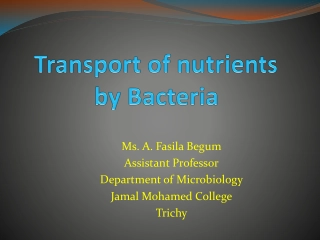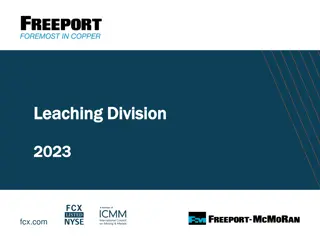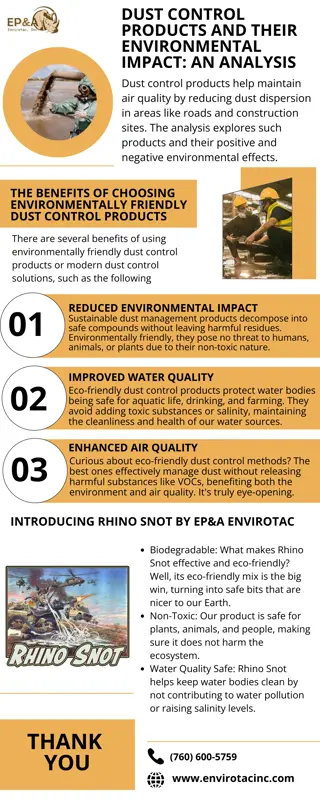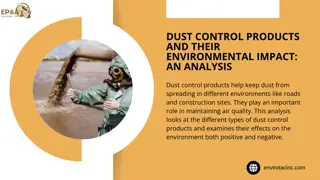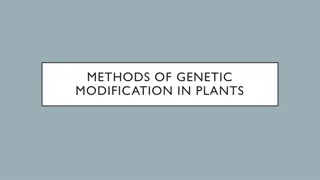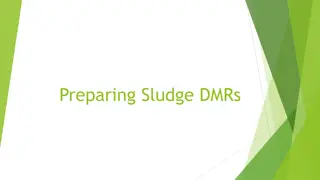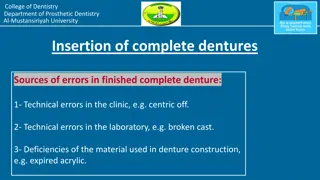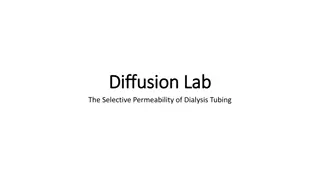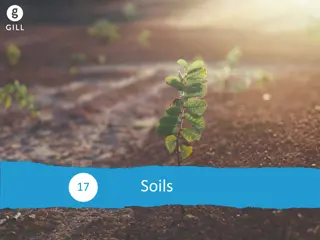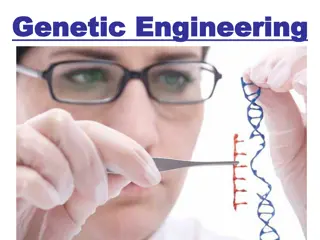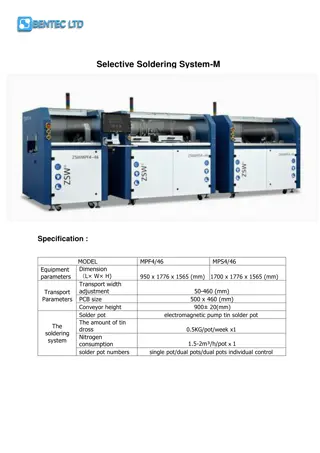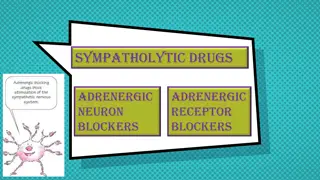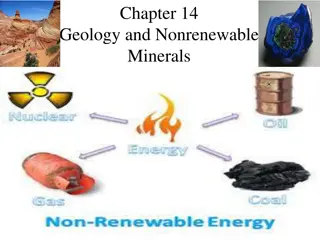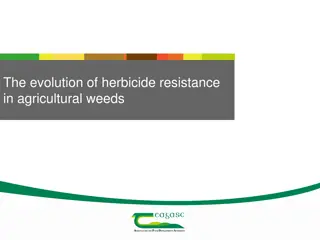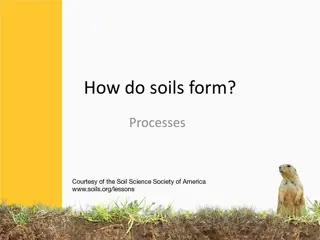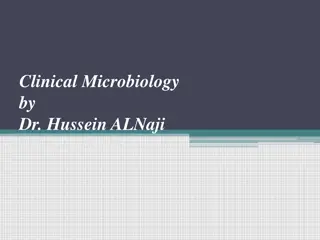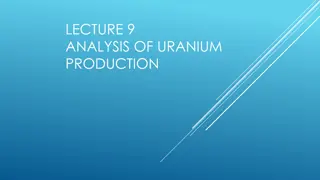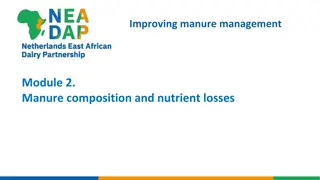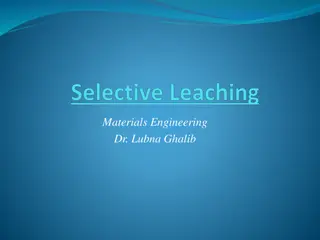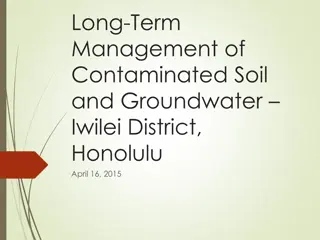Management of a Mute Patient
The differential diagnosis and management of mutism in patients. It covers the types of mutism, including elective mutism, selective mutism, and total mutism, and provides insights into the underlying psychological issues. The presentation also highlights the importance of proper diagnosis for effec
3 views • 34 slides
Nutrient Uptake in Bacteria: Mechanisms and Factors
The process of nutrient uptake in bacteria, including the role of macronutrients, micronutrients, and environmental factors. Learn about the different mechanisms of nutrient transport and the importance of selective permeability in plasma membranes.
0 views • 25 slides
Effective Note-Making Strategies for Exam Preparation
Understand the importance of selective reading and note-making for exams. Learn what to read and what to avoid, along with tips on making efficient notes. Being selective, focusing on quality over quantity, and using effective note-making techniques can enhance your exam revision process.
0 views • 13 slides
MONITORING OF TREASURY OPERATIONS
The state financial control system in Uzbekistan is governed by the Budget Code and involves various bodies such as the Accounts Chamber, Ministry of Economy and Finance, and Treasury Service Committee. It includes methods like full control and selective control, types such as preliminary and ongoin
5 views • 10 slides
Improving HER2 Targeting in NSCLC With Selective TKI
HER2 activation plays a crucial role in promoting tumor proliferation and survival in NSCLC. Driven by oncogenic downstream signaling pathways, HER2 overexpression and gene amplification lead to the formation of heterodimers and activation of key signaling cascades. Additionally, HER2 mutations are
0 views • 36 slides
Mining Emergency Response Procedures and Leaching Operations
Explore a comprehensive guide covering emergency response procedures in mining operations, including Mayday protocols and safety measures. Learn about leaching division, site specifics, operations, and more at Morenci. Discover the process from crushed ore to cathode production. Stay informed on han
1 views • 54 slides
Understanding the Fate of Herbicides in Soil
The fate of herbicides in soil is influenced by factors such as micro-organism decomposition, chemical decomposition, photodecomposition, adsorption by soil, surface runoff, leaching, plant uptake, and volatilization. Micro-organisms like algae, fungi, actinomyces, and bacteria play a crucial role i
6 views • 7 slides
Selective Aldose Reductase Inhibitor for Diabetic Cardiomyopathy Treatment
The ARISE-HF study presents primary results on the effectiveness of a selective aldose reductase inhibitor in treating diabetic cardiomyopathy, a common complication of diabetes mellitus leading to heart failure. The study highlights the increased risk of heart failure in individuals with diabetes,
2 views • 23 slides
Dust Control Products and Their Environmental Impact: An Analysis
In the battle against dust, dust control products have become commonplace. However, the environmental consequences of these seemingly innocuous solutions often go unnoticed. Due to high chloride concentrations leaching into our environment, salinization remains a serious threat to North American fre
0 views • 1 slides
Dust Control Products and Their Environmental Impact: An Analysis
In the battle against dust, dust control products have become commonplace. However, the environmental consequences of these seemingly innocuous solutions often go unnoticed. Due to high chloride concentrations leaching into our environment, salinization remains a serious threat to North American fre
0 views • 9 slides
Different Methods of Genetic Modification in Plants
Genetic modification in plants can occur through natural selection, selective breeding, and induced mutations. Natural selection involves breeding compatible species to create offspring with desired traits, while selective breeding is a multi-generational process to breed organisms with specific cha
3 views • 11 slides
Understanding Sludge Disposal Regulations in Oklahoma
Major facilities in Oklahoma must adhere to specific regulations when disposing of sludge, with two primary methods of disposal: Landfill and Land Applied. EDMRs must be submitted annually by February 19th, covering the previous year. Testing requirements include Toxicity Characteristic Leaching Pro
0 views • 30 slides
Common Errors in Complete Denture Insertion and Selective Grinding Techniques
Errors in complete denture construction can arise from technical mistakes in the clinic or laboratory, as well as material deficiencies. The use of intraoral selective grinding techniques like articulating paper and occlusal indicator wax can help correct errors in occlusion and balance for better d
0 views • 6 slides
Understanding C Codes in Institutional Student Information Records (ISIRs)
C codes are indicators generated by CPS requiring resolution from the Financial Aid Administrator. This article explores the process of resolving C codes and highlights the seven common areas where C codes are generated, including Selective Service, Social Security, and Veterans Affairs matches. It
0 views • 32 slides
Advances in Antimicrobial Drugs: Selective Toxicity and Classification
The development of antimicrobial drugs has significantly improved therapeutics by controlling infections and preventing complications. These drugs target invading microorganisms using selective toxicity, sparing host cells. Antimicrobial drugs are classified based on site, mechanism of action, and c
0 views • 30 slides
Exploring Dialysis Tubing Permeability: Glucose, Starch, and Iodine Experiment
This experiment investigates the permeability of dialysis tubing to glucose, starch, and iodine. By observing color changes and conducting tests, the study demonstrates the selective movement of molecules across the membrane, highlighting the concept of selective permeability in cells.
0 views • 9 slides
Understanding Soil Composition and Importance
Explore the world of soil and its significance as a natural resource by discovering its composition and how it affects plant growth. Learn about the main ingredients of soil, its permeability, and the role of water, air, and organic matter. Gain insights into how soil supports plant life through lea
1 views • 30 slides
Understanding Catch Crops and Kale Cultivation
Catch crops are fast-growing crops cultivated during fallow periods, offering advantages like providing additional winter fodder and preventing nitrogen leaching. Kale, a popular catch crop, has a biennial growth cycle and various varieties with different characteristics. Factors like soil suitabili
0 views • 17 slides
Understanding Genetic Engineering and Selective Breeding
Genetic engineering involves changing the DNA in living organisms to create new traits, resulting in genetically modified organisms (GMOs). Techniques include artificial selection, cloning, gene splicing, and gel electrophoresis. Selective breeding is a form of artificial selection where animals wit
5 views • 37 slides
Advanced Selective Soldering System with Flux Spray and Preheating Modules
The Selective Soldering System-M offers precise soldering capabilities with features like individual pot control, flux spray module for reduced contamination, and preheating module for lead-free and multi-layer boards. It minimizes flux consumption and ionic contamination while ensuring high positio
0 views • 6 slides
Understanding Adrenergic Neuron Blockers: Mechanisms and Pharmacological Effects
Explore the mechanisms of action of adrenergic neuron blockers and classify adrenergic receptor blockers into selective and non-selective categories. Delve into the pharmacokinetic aspects and pharmacodynamic effects of these blockers, such as false transmitter formation, store depletion, release in
0 views • 29 slides
Earth's Geological Processes and Environmental Impact of Mining
Earth's geological processes involve the formation and movement of tectonic plates, creating divergent and convergent boundaries, leading to events like earthquakes and volcanic eruptions. Gold mining, a process that extracts small amounts of gold from large quantities of rock using cyanide leaching
0 views • 51 slides
Understanding Herbicide Resistance in Agricultural Weeds
This comprehensive content covers the evolution of herbicide resistance in agricultural weeds, including the origins of herbicides, cases of resistance, target site resistance, and non-target site resistance. It explains the definition of weeds, types of herbicides, selective and non-selective herbi
0 views • 32 slides
Understanding Soil Formation Processes and Changes Over Time
Soil formation involves several processes such as additions, losses, translocations, and transformations. Additions like rainwater and organic matter, losses from evaporation and leaching, translocations by gravity and organisms, and transformations of components all contribute to the development an
0 views • 10 slides
Understanding Selective and Differential Media in Clinical Microbiology
Mannitol Salt Agar, MacConkey's Agar, Eosin Methylene Blue Agar, and Salmonella Shigella Agar are crucial tools in clinical microbiology for isolating and identifying specific bacteria. These selective and differential media help differentiate between different strains based on their ability to ferm
0 views • 13 slides
Analysis of Uranium Production in Central Asia: Focus on Kazakhstan
Central Asia, particularly Kazakhstan, has emerged as a significant player in uranium production. With over 50 known uranium deposits and a shift towards in situ leaching (ISL) mining, Kazakhstan has become the world's leading uranium producer. Kazatomprom, the national atomic company, plays a cruci
0 views • 26 slides
Understanding Judicial Restraint vs. Judicial Activism & Selective Incorporation in U.S. Law
Judicial restraint emphasizes a strict interpretation of the Constitution, while judicial activism advocates for a flexible approach to adapt to modern circumstances. Selective incorporation examines the application of the Bill of Rights to state actions, especially relevant during the 14th Amendmen
0 views • 13 slides
TI Information Selective Disclosure in Electronic Layout Review
Review of selective disclosure recommendations for TPS546D24A layout design by TI, including tips for noise reduction, component placement, and signal routing to optimize performance and reduce interference. Detailed images and guidelines for improving layout quality and signal integrity are provide
0 views • 6 slides
Understanding Manure Management: Compositions, Nutrient Losses, and Factors
Explore the complexities of manure management by delving into manure compositions, nutrient losses, and the various factors influencing the quality and quantity of manure. Learn about the impact of animal species, diets, and management practices on manure characteristics, as well as strategies to mi
0 views • 29 slides
Understanding Selective Leaching in Materials Engineering
Selective leaching, also known as de-alloying, is the process of selectively removing one element from an alloy through corrosion. Dezincification in brass is a common example of this phenomenon, where zinc is preferentially attacked, leaving behind a weakened copper structure. It can occur in diffe
0 views • 14 slides
Long-Term Management of Contaminated Soil and Groundwater in Iwilei District, Honolulu
The Iwilei District in Honolulu, Hawaii, spans 315 acres with multiple landowners and responsible parties. It features commercial and industrial use, including bulk fuel terminals, former MGP site, active/inactive petroleum pipelines, and Dole Cannery. The area has been impacted by petroleum-contami
0 views • 25 slides
Understanding Selective Breeding: Benefits and Process
Selective breeding is a method where humans control the breeding of organisms to emphasize or eliminate specific traits. By choosing parents with desirable characteristics, breeders aim to create offspring with those traits. While advantageous for creating economically important varieties, it can al
0 views • 12 slides
Gold Extraction Methods and Characteristics Explained
Gold extraction involves various methods such as hard rock mining, panning, sluicing, and cyanidation. Gold is known for its density, malleability, conductivity, and durability, making it ideal for jewelry, dentistry, and technology. Different types of gold ores exist, including native gold and ores
0 views • 12 slides
The Many Faces of Gold: Properties, Production, and Ecological Risks
Gold, a yellow, glossy, and durable metal, is highly conductive and resistant to corrosion. It reacts only with aqua regia and is found in pure form in rocks or as an alloy with silver. Gold mining involves cyanide leaching, primarily in South Africa, the Urals, and Australia. However, it poses ecol
0 views • 12 slides
Understanding Selective Mutism: Diagnosis and Intervention Overview
Selective Mutism (SM) is an anxiety disorder affecting children, characterized by a fear of speaking in certain environments. This overview delves into what SM entails, its symptoms, severity levels, diagnosis methods, and best practice intervention strategies. It also explores real-life case studie
0 views • 53 slides
Characteristics and Effects of Fluorine Release from Shallow High-Fluoride Soils
Shallow groundwater contaminated with high levels of fluorine poses a significant risk of fluorosis in areas like Gaomi, China. This presentation by Kyle Ziemba highlights the repercussions of fluorine release from soil into aquifers, leading to dental and skeletal damage. Experiments conducted in G
0 views • 12 slides
Understanding Selective Incorporation: Evolution of Constitutional Rights
Explore the evolution of constitutional rights through the lens of selective incorporation, focusing on the 14th Amendment, interpretation of the Bill of Rights, and landmark Supreme Court cases. Delve into how the scope of fundamental rights expanded from a federal to state level, shaping the legal
0 views • 10 slides
Sustainable Flotation Process with Lignin Collectors for Selective Extraction of Base Metals
Aimed at developing a sustainable flotation process using lignin collectors for selective extraction of base metals, the LIGNOFLOT project focuses on enhancing the economic and environmental impact of the Swedish forest and mining industry. Through the production, preparation, and flotation testing
0 views • 5 slides
Interactive Model Demonstrating Kidney Function for Understanding Filtration and Selective Reabsorption
Explore the function of the kidney through a hands-on model activity involving blood components, filtration, selective reabsorption, and urine formation. This educational demonstration helps students grasp the processes involved in the kidney's role in maintaining homeostasis, including the impact o
0 views • 4 slides
Housing Standards Update: Melcombe Regis Selective Licensing and Alternative Proposal
Housing Standards Service Manager Richard Conway provides an update on the progress of the Melcombe Regis Selective Licensing initiative and explores an alternative proposal involving voluntary landlord accreditation and targeted enforcement to improve housing standards. The Executive Advisory Panel
0 views • 7 slides

